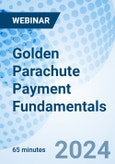Understand the general categories of executives to which section 280G applies and the methods available to reduce or eliminate exposure.
Under the Internal Revenue Code (IRC), corporations that make excess parachute payments lose significant tax deductions, and the recipient is subject to a 20 percent excise tax on such excess payments. Additionally, excess parachute payments can further limit the deductibility of other compensation paid by the corporation. This presentation will help the audience gain knowledge of the rules and assess the tax impact on corporations and employees when golden parachutes are triggered by a change in control of the employer. The live webinar also explains various issues that corporations should keep in mind when applying mitigation techniques prior to or after the change in control.
Learning Objectives
- You will be able to describe the impact of the golden parachute rules on public and private entities.
- You will be able to discuss mitigation techniques when a company undergoes a change in control.
- You will be able to explain the concept of section 280G and the tax implications on corporations and employees subject to section 280G.
- You will be able to identify payments that potentially become parachute payments under section 280G.
Agenda
What Is Section 280G
- Overview
- Payments/Benefits Covered by the Golden Parachute Rules
- Tax Implications
Golden Parachute Rules - Section 280G
- Base Amount
- 3X Base Amount (Safe Harbor)
- Parachute Payments
- Excess Parachute Payments
Section 280G Exemptions
- Small Business Corporation
- Tax Exempt Entity
- Non-Public Corporation With Shareholder Approval
Section 280G Mitigation Concepts
- Base Amount Planning
- Reasonable Compensation Prior to the Cic
- Reasonable Compensation After the Cic
Other M&A Compensation Issues
- Earnouts
- Adjusting Stock Options Upon a Transaction
- Impact on Tax Deduction
Speakers

Riley Dinh,
Alvarez & Marsal- Senior associate in the compensation and benefits practice at Alvarez & Marsal Taxand
- Practice emphasizes all aspects of executive compensation and employee benefits
- Helps companies tackle how to effectively and efficiently pay, incentivize, and retain their employees
- Works with companies to design and benchmark annual bonus and long-term incentive compensation programs, all while considering the applicable tax, accounting, and other regulatory ramifications
- Certified Public Accountant (CPA) licensed in Texas
- LL.M. degree, International and Comparative, SMU Dedman School of Law; M.S. degree in accounting, SMU Cox School of Business; B.B.A. in accounting, SMU Cox School of Business

Matthew Porter,
Alvarez & Marsal- Director in the Dallas office of Alvarez & Marsal
- Practice centers around complex tax, regulatory, and corporate governance issues related to executive compensation with a particular emphasis on corporate restructuring/turnaround (including the development and defense of Key Employee Incentive and Retention Plans) and M&A (including the application of Section 280G to ‘golden parachute payments’)
- Presents on executive compensation and benefits issues with a focus on the design and implementation of executive compensation programs at public and private companies
- Editor of Alvarez & Marsal’s annual Energy Compensation Report and bi-annual Change In Control Compensation Report
- Licensed attorney, member of the State Bar of Texas, executive committee member of the Dallas Bar Association’s Compensation and Benefits Section, Certified Executive Compensation Professional (CECP) through the World at Work organization, and a member of the North Texas Compensation Association (NTCA)
- J.D. degree, University of Chicago; B.B.A. degree in finance and B.A. degree in economics, magna cum laude, Texas Tech University
Who Should Attend
This live webinar is designed for human resource managers, payroll professionals, personnel managers, benefits professionals, controllers and CFOs, accountants, business owners, bookkeepers and attorneys.










